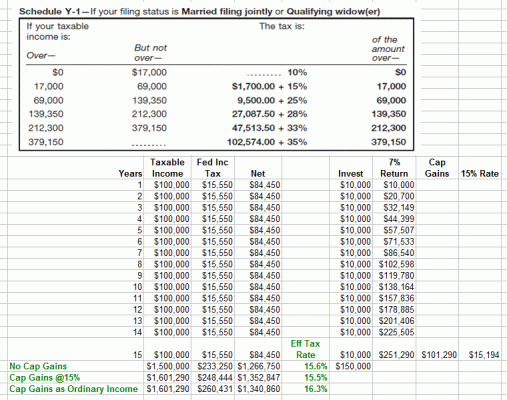Midpack
Give me a museum and I'll fill it. (Picasso) Give me a forum ...
I've always meant to do the math just to see how the current cap gains 15% tax rate would compare to cap gains taxed as ordinary income. At $100K/yr and saving/investing 10% per year, at the end of 15 years it doesn't make a big difference. In that the money invested has already been taxed (and reduced what you have to invest for yourself), does it make sense for gains to be taxed as ordinary income - double taxed?"
I am not as interested in the impact on the super-rich, that doesn't apply to anyone here AFAIK.
I am not talking about Corp income, hedge funds, etc. - just personal income and cap gains. What's "fair" isn't readily apparent to me...
Effective Tax Rate:
- on income (no investing/cap gains) = 15.6%
- on income with cap gains @ 15% = 15.5%
- on income with cap gains as ordinary income = 16.3%
NO POLITICS PLEASE, BUT FIRE RELATED IN THAT MOST IF NOT ALL OF US WILL HAVE CAP GAINS TO DEAL WITH IN RETIREMENT.
I am not as interested in the impact on the super-rich, that doesn't apply to anyone here AFAIK.
I am not talking about Corp income, hedge funds, etc. - just personal income and cap gains. What's "fair" isn't readily apparent to me...
Effective Tax Rate:
- on income (no investing/cap gains) = 15.6%
- on income with cap gains @ 15% = 15.5%
- on income with cap gains as ordinary income = 16.3%
NO POLITICS PLEASE, BUT FIRE RELATED IN THAT MOST IF NOT ALL OF US WILL HAVE CAP GAINS TO DEAL WITH IN RETIREMENT.
Attachments
Last edited:

